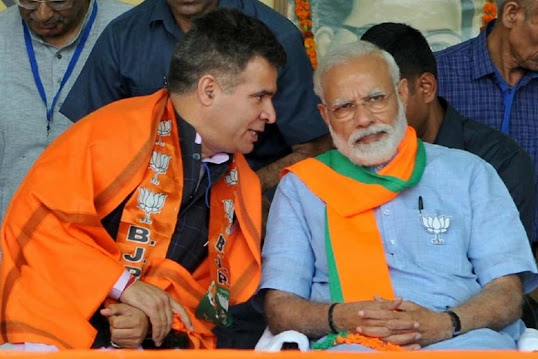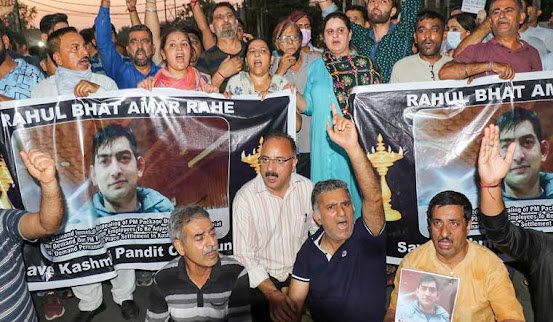From being the grand old party of India that ruled the nation for more than six decades to have reduced itself to a sorry shadow of its former self, the comprehensive saga of the Indian National Congress (INC) today stands marred by constant political depreciation since the onset of the Modi era in 2014.
A political organisation shackled by the chains of nepotism and family supremacy has in recent history seen some of its tallest leaders, young and veterans alike, abandoning the sinking ship.
Outgoing leaders have been blunt in criticising the lack of vision at the core leadership level of the party; some lamenting unwarranted snubbing after years of service or the absence of a transparent and democratic environment within the Congress to hold the Gandhis accountable for their ineffectiveness to consolidate the party and steer it in the right direction.
The latest abandoner has been the long-term Congress loyalist Ghulam Nabi Azad, serving another body blow to the party’s chances of revival with his exit. Mincing no words in his resignation letter to Congress President Sonia Gandhi, Azad had attributed his departure to the sidelining of senior leaders and the increasing sway of a "coterie of inexperienced sycophants”.
 |
| image source : odishatv.in |
With Azad’s abdication shortly followed by the embarrassment Ashok Gehlot had to face in Rajasthan over the disciplinary action taken against his key MLAs for bypassing the party high command, the Congress’s ‘Bharat Jodo Yatra’ that turned out to be a lacklustre media spectacle at best and, more recently, the new Congress president election which is hardly expected to bring a change in fortune for the declining party - the ceaseless plummeting of the Congress’s relevance and clout across India has a plethora of ramifications.
Strictly in the context of Jammu and Kashmir, the politics of the region from an electoral calculus standpoint has gone through a massive rejig courtesy of Ghulam Nabi Azad floating his own Democratic Azad Party (DAP). It is fascinating to witness how Congress’s slump at a national level has caused such a profound effect on J&K that the UT’s political landscape now looks like a rearranged chessboard with DAP into the mix.
Azad Effect
Azad, a former chief minister of the erstwhile state of J&K and a stalwart in his own right, may end up making big gains as the UT gears up for polls which are likely to take place in the coming six to eight months.
The Delimitation Commission issued its final order earlier in May, adding seven new seats to the J&K legislative assembly to take its tally up from the previous strength of 83 to 90. Six new seats were allotted to the Hindu-majority Jammu region, increasing its representation from 37 to 43 seats while one seat was added to the Muslim-majority Kashmir which now has 47 seats in the redesigned assembly.
Post the culmination of the delimitation process, the Election Commission asked for a special summary report of electoral rolls with November 25 as the deadline for the publication of the final electoral roll. This has ruled out the possibility of holding the election towards the end of this year. Incidentally, this situation augurs ever so well for DAP as it gives its founder Azad, the newest player in J&K’s game of thrones, enough time to strengthen his ground presence.
 |
| image source : outlookindia.com |
On the other hand, Azad’s entry into the macro scheme of things in J&K only a few months ahead of the polls puts other players, namely the Gupkar alliance and the Apni Party at a potential disadvantage. After the scrapping of J&K’s special status, the sheen has substantially worn off for the two heavyweights, the National Conference (NC) and the People’s Democratic Party (PDP). Azad throwing his hat into the ring at a critical juncture will in all probability dent the chances of resurrection for the NC and the PDP greatly.
J&K’s new political calculus
In the aftermath of the abrogation of Article 370 in August 2019, there was an exodus of a number of political leaders mainly from the PDP to Syed Altaf Bukhari’s Apni Party inspite of the fact that the former had emerged as the single largest party with 28 seats in the 2014 J&K assembly elections.

image source : hindustantimes.com
It should not come as a major surprise if the Apni Party this time around, or for that matter, the NC and the PDP, meet a similar fate again by losing some of their personnel to the DAP in the run-up to the polls. As far as the Congress is concerned, it has shrunk to an even lesser fringe political party in J&K after many of its senior regional leaders left the party to join Azad.
Although Azad will have a significant advantage in the districts of Rajouri and Poonch along with Muslim-dominated parts of the Chenab valley and Pir Panjal but he could well turn out to be a choice for the Hindu vote bank in Jammu mainly because of his non-communal and development-orientated image. His clean track record, besides being somebody who, unlike the Abdullahs and the Muftis, does not carry the baggage of separatist or Pakistan-sympathising sentiments works immensely in his favour.
 |
| image source : hindustantimes.com |
Azad-Modi bonhomie
In his media briefings and interactions with the people of J&K after snapping ties with the Congress, Azad has been categorical about the impossibility of the reinstatement of Article 370, thereby painting a realistic picture before the Kashmiri people and falsifying the Gupkar lobby’s fake claims and promises of restoring J&K’s former status made purely for electoral benefits.
Consequently, it becomes unambiguous that Azad is leaning towards the Modi government’s narrative of Naya Jammu and Kashmir. Even at an interpersonal level, the relationship between him and Prime Minister Narendra Modi was cordial and one of mutual respect when the former was the Leader of the Opposition in the Rajya Sabha, and continues to remain the same.
Hence, the forging of an alliance between the BJP and the DAP to counter the Gupkar lobby could be on the cards, depending of course on several factors, albeit neither side would give the other anything on a platter.
 |
| image source : udayvani.com |
Notwithstanding that the NC and the PDP managed to taste success in the 2020 DDC polls by fielding joint candidates, the assembly election will be a different ball game altogether.
With Azad in the mix now and a lot of time left before J&K goes to the polls, the Gupkar alliance appears to be on shaky ground with regard to its unity and power. Whether this situation translates into an electoral triumph in J&K for the BJP or a superlative performance for the debutant DAP or an ascent to power for a BJP-DAP combine, only time will tell, but the way things are unfolding at the moment certainly puts Modi’s BJP and Azad’s DAP in the driver’s seat.
















